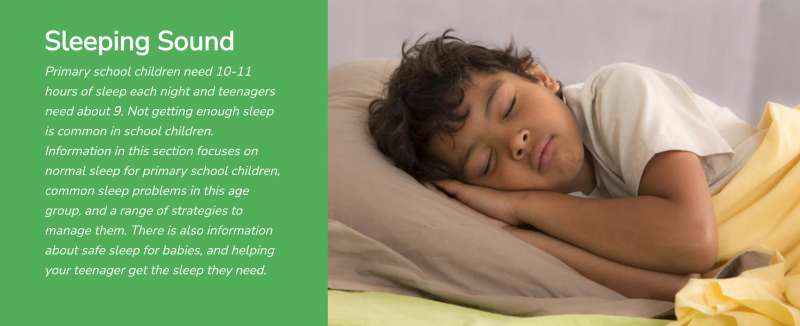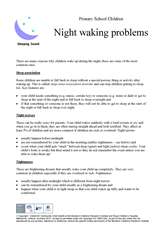Night Waking Problems
Night Waking Problems
There are many reasons why children wake up during the night - find out about some of the most common ones.
Key points about night waking problems
- there are many reasons why children wake up during the night
- some children are unable to fall back to sleep without a special person, thing or activity after waking up
- night terrors are when a child wakes suddenly with a loud scream or cry and they often stare straight ahead and look terrified
- nightmares are frightening dreams that usually wake your child up completely
- children with anxiety can lie in bed worrying about things
- children with restless legs have an uncomfortable feeling in their legs when trying to fall asleep or during the night
This page is about sleep in primary school children. It's part of a whole section on sleeping sound.
How can 'sleep association' contribute to night waking problems?
Some children are unable to fall back to sleep without a special person, thing or activity after waking up. This is called 'sleep onset association disorder' and can stop children getting to sleep too. Key features are:
- your child needs something (such as music, a certain toy) or someone (for example, Mum or Dad) to get to sleep at the start of the night and/or fall back to sleep overnight and
- if that something or someone is not there, they will not be able to get to sleep at the start of the night or fall back to sleep overnight
Find out how to manage sleep association.
How can 'night terrors' contribute to night waking problems?
These can be really scary for parents. Your child wakes suddenly with a loud scream or cry and when you go in to them, they are often staring straight ahead and look terrified. They affect at least 3 in 100 children and are more common if children are sick or overtired. Night terrors:
- usually happen before midnight
- are not remembered by your child in the morning (unlike nightmares) and
- happen when your child gets 'stuck' between deep (quiet) and light (active) sleep cycles - your child's body is awake but their mind is not, so they do not remember the event unless you are able to wake them up
Find out how to manage night terrors.
How can nightmares contribute to night waking problems?
These are frightening dreams that usually wake your child up completely. They are very common in children especially if they are overtired or sick. Nightmares:
- usually happen after midnight which is different from night terrors
- can be remembered by your child usually as a frightening dream and
- happen when your child is in light sleep so that your child wakes up fully and wants you to comfort them
Find out how to manage nightmares.
How can anxiety contribute to night waking problems?
We do not really know how common anxiety is as a cause of sleep problems in school children, but it is probably common. Children with anxiety may:
- lie in bed worrying about things
- stay in their bed rather than getting in and out of bed all the time and
- be a 'worrier' in general about life
Find out how to manage anxiety as a cause of sleep problems.
How can 'restless legs' contribute to night waking problems?
Children with restless legs have an uncomfortable feeling in their legs when trying to fall asleep or during the night. Children with restless legs may:
- describe the uncomfortable feeling as a 'creepy/crawly' or 'pulling' feeling, or as 'growing pains'
- move around a lot in bed to try to stop the uncomfortable feeling
- walk or pace around at bedtime
- be unable to sit still for a long time and
- be tired or cranky the next day due to lack of sleep
Find out how to manage restless legs.
See more KidsHealth content on sleeping sound
This page last reviewed 16 March 2023.
Do you have any feedback for KidsHealth?
If you have any feedback about the KidsHealth website, or have a suggestion for new content, please get in touch with us.
Email us now

